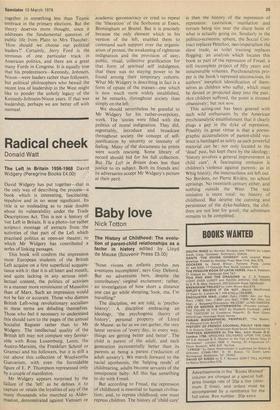Radical cheek
Donald Watt The Left in Britain 1956-1968 David Widgery (Peregrine Books £4.00)
David Widgery has put together—that is the only way of describing the process—a book which is interesting, fascinating, repulsive and in no sense significant. Its title is so misleading as to raise doubts about its vulnerability under the Trade Descriptions Act. This is not a history of THE Left in Britain. It is a photo(or rather scripto-) montage of extracts from the activities of that part of the Left which practised politics as open-air theatre; to which Mr Widgery has contributed a series of linking passages.
This book will confirm the impression most European students of the British Left acquire on a first superficial acquaintance with it: that it is all heart and mouth, and quite lacking in any serious intellectual content, the politics of activism in a manner more reminiscent of Mussolini / than of Marx. Such an impression would not be fair or accurate. Those who dismiss British Left-wing revolutionary socialism in these terms are deluding themselves. Those who feel it necessary to understand this should turn to the pages of the annual Socialist Register rather than to Mr Widgery. The intellectual quality of the British left may not compare very favourable with Rosa Luxemburg, Lenin, the Austro-Marxists, the Frankfurt School or Gramsci and his followers, but it is still a cut above this collection of Woolworths Guevarism, with even the formidable figure of E. P. Thompson represented only by a couple of manifestos.
Mr Widgery appears surprised by the failure of the 'left' as he defines it to capture or retain the loyalties of any of the many thousands who marched to Aldermaston, demonstrated against Vietnam or ,academic gerontocracy or tried to repeat the 'liberation' of the Sorbonne at Essex, Birmingham or Brunel. But it is precisely because the only element which in his version of the left, enabled them to command such support over the organisation of protest, the awakening of righteous indignation and the provision of easy, public, ritual, collective gratification for that form of spiritual self indulgence, that there was no staying power to be found among their temporary cohorts. What Mr Widgery is describing in fact is a form of opiate of the masses—one which is now much more widely established, as he remarks, throughout society than simply on the left.
We should nevertheless be grateful to Mr Widgery for his rather-overpricey, work. The 'sixties were filled with the politics of moral indignation. They did, regrettably, introduce and broadcast throughout society the concept of selfjustification by sincerity or intensity of feeling. Many of the documents he prints were worth rescuing. Some library of record should bid for his full collection. But The Left in Britain does less than justice to its subject. Both its friends and its adversaries accept Mr Widgery's picture at their peril.


































 Previous page
Previous page